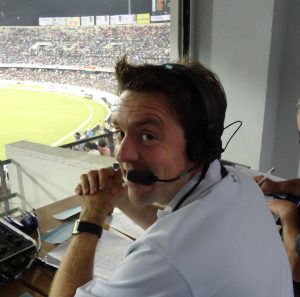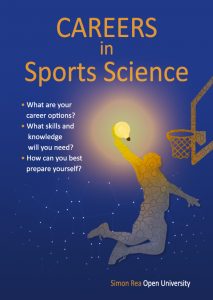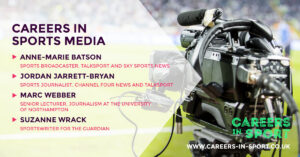Alistair Bruce-Ball
Job title Sports Broadcaster
Employer BBC Radio 5 Live
Qualifications MA Broadcast Journalism and BA (Hons) and Italian and Drama

Sports broadcaster Alistair Bruce-Ball works for BBC Radio 5 Live. He can be heard most weekends commentating on Premiership football. He also commentates on major golf tournaments and The Ryder Cup. Since 2018 he has been the host of 5 Live’s football phone in programme ‘606’ with Chris Sutton.
How did you get into a career in sports broadcasting?
 I was always a huge sports fan as a child. I played everything to a reasonable school level but was never going to be able to play a sport at a professional level. My brother and I were huge sports fans and we always collected football stickers for the World Cups and played football and cricket in the back garden.
I was always a huge sports fan as a child. I played everything to a reasonable school level but was never going to be able to play a sport at a professional level. My brother and I were huge sports fans and we always collected football stickers for the World Cups and played football and cricket in the back garden.
However, I did a degree in Italian and Drama at Bristol University which had no relation to sport at all, but I enjoyed languages and I enjoyed acting. You could argue that both these things are valuable to me now as there is a large element of performance in what I do. I got to the last six months of my degree and all my friends were applying for jobs in advertising, marketing or banking while I hadn’t given any serious thought to what I actually wanted to do. It was my mum who suggested sports journalism to me. She did all the initial digging around and found some post-graduate broadcast journalism courses.
When I studied broadcast journalism in the mid-90s there were about five or six really good places around the country where you could study for a post graduate degree in broadcast journalism. My initial thought was watching sport for a living and talking about it sounded too good to be true. These courses were not sports journalism courses as they were courses to train to be a journalist and most people went from there on to work in news journalism. When I started looking into getting onto a course I quickly realised that I hadn’t really demonstrated any commitment to getting into journalism. There was nothing on my CV that showed I had done any work experience, such as student radio or anything like that. To get some sports broadcaster experience I took a year off after university and wrote to hundreds of radio stations, newspapers, television companies but so many replies came back as ‘no’. Luckily, I did get the odd one or two that gave me a chance and in particular BBC Radio Bristol said to me ‘come in one Saturday afternoon and see what we do’. I did that and a couple of weeks later I got a call from them saying the reporter who was covering the Yeovil Town match on Saturday had fallen sick. They asked me to buy a mobile phone and get down to Huish Park on Boxing Day where I covered Yeovil Town against Bishop Stortford in the Isthmian Premier Division. I used my new phone to do the match report. I’m sure if I listen to those early reports now they would sound dreadful, but they must have been okay as this led me to doing quite a lot of work for BBC Radio Bristol, although it was unpaid. That summer of 1997 I covered Gloucestershire County Cricket Club home and away in the County Championship and I was paid £10 a day.
After doing that work experience I was offered a place at Cardiff University and studied there for a year from 1997-1998. My goal was to get into journalism, get into a news room and then express my interest in sports journalism. I had always wanted to get into sports journalism as that is where my passion lay. I had to do a general journalism course because there weren’t any specialist sports journalism courses then and the basic skills of journalism are the same in whatever field you are reporting in. Those skills are firstly recognising a story and secondly telling that story succinctly.
In June 1998 I started my first full time job at BBC Radio Bristol. My boss there was Geoff Twentyman, a former Bristol Rovers player, who was a good mentor to me and he felt that I had the skills needed for football commentary. One Friday out of the blue he said to me ‘by the way you are doing full commentary on Bristol Rovers versus Notts County tomorrow’. He did this so I didn’t have too much time to get nervous about it.
How do you learn the skills required for football commentary?
I was never really taught how to do commentary and I just had to give it a go and get feedback from people like Geoff and later on my fellow commentators at 5 Live. I learnt from listening to commentators that I actually enjoy listening to and what I think is good commentary and what I think is bad commentary. It’s not quite that you copy people’s style but you certainly steal the best bits from the broadcasters you like. In terms of specific football commentary schooling, I’m not sure I ever actually had any and I’m not sure anyone actually does.
I worked for three years at BBC Radio Bristol doing football commentary every Saturday, cricket commentary in the summer and some rugby, as in local radio you do a bit of everything. In 2001 a job came up in London at BBC Radio 5 Live and applied for it and got the position. This was working as a bulletin reader, which was actually a step backwards in terms of the commentary I had been doing previously. But I thought that I needed to get onto the bottom rung of the ladder in national radio and then work up from there. I did three years in the role of general sports reporter before getting a job as a full-time football reporter in 2004. In this role I also got the chance to commentate on other sports, such as golf, reporting on the British Open, US Open and The Ryder Cup, which I really enjoy, I’ve also been a sports broadcaster on cricket, rugby and The Olympic Games covering slalom canoeing, cycling, shooting and equestrianism. I’ve reported on all sorts of sports that I had very little knowledge about.
What skills are required to be successful?
I was told I would not be able to work in sales as I wouldn’t be ruthless enough to close a deal. It’s true that in my line of work there are times when you need a bit of steel such as when you are in a one-to-one post-match interviews with the likes of Pep Guardiola or Jose Mourinho when their team have lost and you have to look them in the eye and ask them hard questions. You try not to be intimidated by them as that is exactly what they are trying to do to you. If they behave unreasonably, as long as you have asked fair questions, then they are the ones who are going to come out looking a bit silly. It can be pretty uncomfortable at the time.
What does a typical working week involve as a sports broadcaster?
I do get given a rota for the week ahead I will usually be at matches on Saturday and Sunday. Reporting is where I give 20 to 30 second updates and report on goals during the full commentary of another match. In the week leading up to the matches I will do a lot of preparatory work on the teams and the players. There is a lot of preparatory work but more so for a commentary match than a reporting one because you won’t need as much in-depth knowledge on a reporting game compared to a commentary. Preparing for a commentary match is a full day’s work of six to eight hours. I have word document files on all the playing squads but before a match I will update these and transpose the content into hand written notes. I find that when I write by hand the information really goes in. Then I will have Monday and Tuesday off before reporting on a Champions League match on the Wednesday. By Thursday, I will be prepping for a commentary on a Friday night match and then I’ll have a reporting game on either Saturday or Sunday. In most weeks I have five days on and two days off, just like in a normal job, but because I am always working at the weekends I get two midweek days off.
Challenging aspects of being a sports broadcaster?
- When we commentate we actually sit out in the stands rather than being tucked away behind glass, so we are exposed to all the elements.
- If I had any grumbles it would be about the travelling, particularly travelling to and from a midweek game. For example, I might cover a League Cup game that goes to extra-time and penalties and I wouldn’t get out of the stadium until around 11 pm and then have a three-hour drive home on the motorway. At the start, I found the travel quite exciting but once you’ve done it a lot it can become a bit of a grind.
What advice would you offer young people keen to pursue a career as a sports journalist?
I think if I had my time again I’d do more to get ready and prepare for the career that I wanted. I had a bit of a slow start as I did four years at University, another year gaining unpaid experience, a year doing a post graduate course and another year in local radio, so seven years in total. If I had done more and got some experience at a younger age, I would have got going more quickly. To learn about commentary, you must listen to lots of commentators and commentaries on different sports. Above all you must be yourself and develop your own style. I found that initially 5 Live struggled to find the right place for me and it took me a while to find my feet and establish myself with the listeners. You will notice that each commentator has something distinctive about them. For example, Conor McNamara has a distinctive voice and John Murray has a distinctive style of delivery.
You can try what I did as a child and that is watching sport on television with the sound down and then recording yourself on your phone and listening back to it. It is a brilliant way to practice and learn and you can play it to someone who knows about commentary and they can give you advice and guidance on how to improve. That is a good way to learn. Also, don’t get put off by any knock backs you receive, as getting into sports broadcasting is hard and I got so many ‘no’s’ initially before getting in. If you do really want to do it then don’t get discouraged and keep plugging away. You almost need to be a nuisance and badger people until they give you a chance.
Also, there are so many different jobs in our department within BBC Radio 5 Live so if you are not the sports broadcaster, you might be the producer or a researcher. There are researchers who are obsessed by statistics and they put our portfolios about the players in each team together before we go to a World Cup. I had never realised there were so many roles available under the umbrella of sports broadcasting. It is worth researching these opportunities from a young age.
This interview was conducted by Simon Rea, Lecturer in Sports Science at The Open University and a Senior Fellow of the Higher Education Academy. Simon is author of many sports science books including Careers in Sports Science:

Available at: Simon Rea Sports Science
Are you interested in becoming a sports broadcaster and/or a career in sports media? Access more career profiles via our ‘Sports Media‘ section.

Access our Careers in Sports Media webinar on our YouTube channel.

